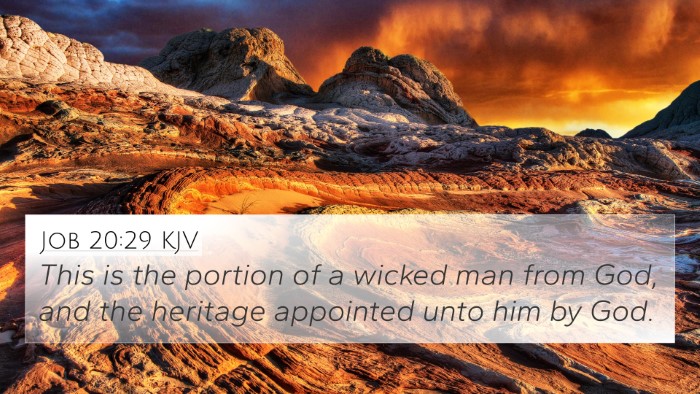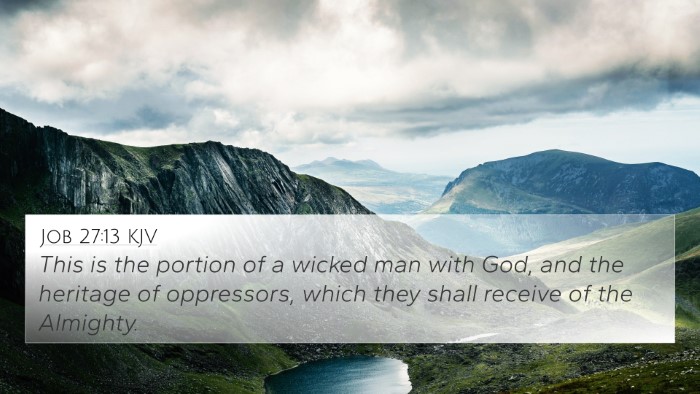Understanding Job 31:2
Job 31:2 (KJV): "For what is of God above? and what is the heritage of the Almighty from on high?"
This verse comes from the heart of Job's discourse, where he reflects on the divine justice and the consequences of human actions. To understand Job 31:2, we must explore its context and the interpretations provided by renowned commentators.
Context of Job 31:2
Job is defending his integrity and righteousness amidst the accusations of his friends who assert that his suffering is a direct consequence of sin. In this chapter, Job emphasizes his relationships with God and humanity, showcasing his commitment to living a life without reproach.
Commentary Insights
- Matthew Henry: Henry highlights that Job is appealing to the ultimate justice of God, questioning what could be more significant than God's oversight in offering a heritage. He suggests that what one receives from God is not just material but spiritual, leading to eternal life.
- Albert Barnes: Barnes points out that Job's inquiry signifies a longing for understanding God's nature and the implications of divine justice. He notes that Job's reference to "heritage" indicates a deep yearning for a righteous reward for living according to God's will.
- Adam Clarke: Clarke comments on the philosophical aspects of Job's question; he stresses that the most pertinent questions about life and morality lead us back to God. The “heritage of the Almighty” is a metaphor for hope that transcends earthly experiences.
Key Themes
The verse encapsulates several themes that contribute to a better understanding:
- The Nature of God: Job is acknowledging God's supremacy and eternal oversight.
- Divine Justice: Questions of fairness and righteousness are central, exploring what justice looks like in the eyes of the Almighty.
- Human Integrity: Job emphasizes his own integrity in the face of dire circumstances, reflecting the struggle between faith and despair.
Bible Verse Cross-References
Job 31:2 relates to various other scriptures that provide thematic connections and enhance our understanding:
- Psalm 16:5: "The Lord is the portion of mine inheritance and of my cup: thou maintainest my lot."
- Proverbs 11:4: "Riches profit not in the day of wrath: but righteousness delivereth from death."
- Ecclesiastes 5:15: "As he came forth of his mother's womb, naked shall he return to go as he came, and shall take nothing of his labour, which he may carry away in his hand."
- Matthew 19:29: "And every one that hath forsaken houses, or brethren, or sisters, or father, or mother, or wife, or children, or lands, for my name's sake, shall receive an hundredfold, and shall inherit everlasting life."
- Philippians 3:14: "I press toward the mark for the prize of the high calling of God in Christ Jesus."
- 1 Peter 1:4: "To an inheritance incorruptible, and undefiled, and that fadeth not away, reserved in heaven for you."
- Hebrews 10:35: "Cast not away therefore your confidence, which hath great recompense of reward."
Comparative Bible Verse Analysis
Examining these cross-references establishes connections between Job's reflections and other Biblical themes. The notion of heritage and God's reward is a recurrent theme, manifesting the continuity across scriptures from the Old to the New Testament. This signifies that Job's thoughts resonate with the wider Biblical narrative of seeking righteousness and divine affirmation.
Tools for Bible Cross-Referencing
Engaging with the Bible's interconnectedness enhances theological understanding and personal faith journeys. Utilizing tools such as:
- Bible Concordance: A helpful guide for tracking themes, words, and phrases across different texts.
- Cross-Reference Bible Study: Methods that allow readers to explore links between various Bible verses.
- Bible Reference Resources: Comprehensive materials to aid in a more profound understanding of scripture interconnections.
Conclusion
In Job 31:2, we find a rich landscape of theological inquiries, moral reflections, and themes that traverse the wider Biblical corpus. The interplay of divine justice, human integrity, and the nature of God in this verse offers profound insights beneficial for anyone studying scripture, facilitating deeper connections and reflections that are important for faith-based discussions and teachings.
Invitation for Further Study
For those interested in delving deeper, consider exploring the connections between Job’s experiences and the teachings of Christ, as well as how other scriptures illuminate the themes presented in this poignant inquiry.





